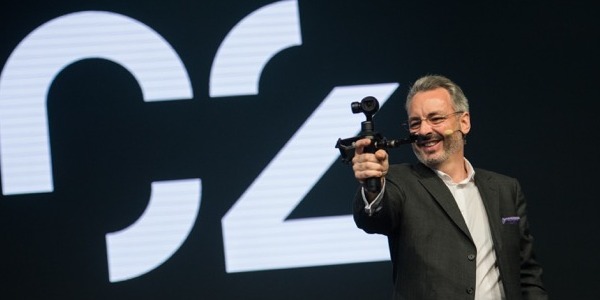 As one might expect of something important developed in Montreal, the commerce and creativity event known as C2 started out over a glass of wine.
As one might expect of something important developed in Montreal, the commerce and creativity event known as C2 started out over a glass of wine.
Those holding glasses that night included Jean Francois Bouchard, president of Sid Lee, and Cirque du Soleil’s Daniel Lamarre. The wine was not part of a celebration, however, but a sombre brainstorming session.
“This came out of 2010 when the economy in Canada was not all that great and Montreal wasn’t faring that great, either,” recalled Richard St. Pierre, C2 Montreal’s president and CEO.
Their conclusions can be found in C2’s logo, which contains some missing pieces in both the “C” and the “2.” This is to represent the people who wind up coming to the three-day event, which runs May 24-26. “For us, the people we interact with are completing the picture,” he said. “We see ourselves as more of a platform than an end state.”
St. Pierre spoke with Marketing by phone. This interview has been edited and condensed.
When you look at what C2 has become today, how was that evolved compared with the early idea?
I think the original vision has only been maintained and even amplified. The intent was twofold at the time: the first was to reinvent the business conference, and I think from that standpoint we did so. From my standpoint, what we are delivering now is what the 21st century expects an adventure of this sort to be delivered. First of all, we don’t consider them visitors, we consider them participants. That changes the game completely. The second intent was to really be what we called a reverse trade mission. We see so much news about important people taking a plane with 30 people and going across the planet to try and solicit contracts and so on. Our point of view was, all this is really about people meeting other people. So how do we make people from far away places come to us instead, and meet the ones they want to do deals with in their own environment?
Your theme this year is “The Many” — looking at the future of collaboration, the media, learning and so on. Why did that feel like something that would resonate with this audience?
Well, nobody can dispute the rise of Uber, Airbnb and all of those collective-driven initiatives. They’re really transforming business, and since C2 is about commerce and creativity, we wanted to reflect the two sides of the story. The first one is what we see in the market where a collective is actually influencing how an industry is perceiving itself and even redefining employment in that industry, in the case of Uber. But we also wanted to convey the flip side of this, which is where algorithms and computers and technologies are elements that drive that human interaction to a great extent. So for example, we will have labs where we present the idea of what might happen if algorithms “take over” in some way. We’re already seeing that in advertising, but there are many other areas where these forces can have unexpected consequences.
Last week C2 announced there would be more than 300 people coming from China. How did that come about and why is that important?
Two years ago we had 26 countries attend C2, which we were very proud of. That’s truly an international venue. Last year we had 43, so we almost doubled it. We were very pleased but the fact is that, for example, we had five people from China and two people from Israel, mostly because it’s very far. We thought about how we could deepen the number of people from a given country that could come. We worked with partners over there — I went physically to those countries like Israel, Estonia, South America, China — and in the case of China, it was three times in the past 12 months. I worked with people — let’s call them promotors for lack of a better term — in order to garner momentum from delegates and corporate citizens. That’s how we ended up with 300 who have confirmed. There are another 30 coming from Israel, another 20 from Brazil and so on. Instead of trying to beat our record of countries, we want to deepen our relationship with those countries, and ultimately create deals with the local business community.
Given the different kinds of participants you attract, is there anything common you hope people will walk away with from C2 this year?
A path forward. Right now what I’m seeing when I speak to people, they understand less and less the environment they’re working in. When we talk about the media, yes, you can say things like social media completely changed the game, so where newspapers were quite all right two decades ago, relying on that now would be a ludicrous idea. But what you realize is that you can speak to pharma, financial people and so on, and overall their requests and requirements are basically the same.











